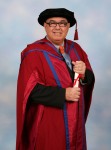
Dr Raymond Coffer FCA
Cultural Historian
PhD, Institute of Modern Languages Research (previously Institute of Germanic and Romance Studies), University of London
Chartered Accountant (1967)
Artist manager (Smashing Pumpkins, Cocteau Twins, The Sundays, Love and Rockets, Ian McCulloch, Curve, Xymox, Swell etc)
E-mail: raymond@richardgerstl.com
Blame Gustav Mahler for igniting my abiding and inexorable interest in fin-de-siecle Vienna, for it was the discovery of the then relatively neglected composer’s first symphony, the Titan, over 50 years ago that led me to a life-long appreciation and study of the the art, music, architecture and politics that grew up there around 1900. Hardly surprising, then, that having spent much of my working life attempting to understand the psyche of some of the most talented musicians of recent times (see above), it seemed a natural step to employ any insights I had gained in the music business on the radical and influential artists who flourished in the city a century ago.
I was particularly drawn to the young Expressionist artist, Richard Gerstl, who, having become the teacher and close friend of the composer Arnold Schönberg, committed suicide aged 25 in 1908 after an ill-fated love affair with Schönberg’s wife, Mathilde. In translating and transcribing several troves of letters and documents, many of which had never been seen or published before, I soon became uniquely knowledgeable on the subject. Moreover, despite never having attended University, my research created considerable academic interest, persuading me to temporarily shelve my ambitions to write a book on the subject in favour of embarking on a doctoral thesis at the Institute of Germanic and Romance Studies, part of the postgraduate School of Advance Studies at the University of London, where I received my PhD in April 2011, and graduated in December that year.
Whilst my findings have obvious connotations in musicological and art historical terms, it should be stressed that I write exclusively as a cultural historian, basing my research on documentary, forensic, oral, circumstantial and other compelling evidence, much of it often new, revised or previously unpublished. As such, I came to write a thesis that not only acts as a monograph of Gerstl’s works and a detailed account of his life, but also examines and, indeed, redefines, the representation of Gerstl’s affair with Mathilde in the visual works of the artist and the musical works of Schönberg and others, including, for example, Zemlinsky and Alban Berg, whose Chamber Concerto (1923–1925) contains a secret programme dedicated to Mathilde.
As a result, the thesis presents a powerful revision of the chronology of Gerstl’s works and a persuasive argument against the previously held belief that Schönberg’s works from before Gerstl’s suicide were in some ways influenced by Mathilde’s infidelity with the young artist. This is of particular significance regarding the Schönberg’s Second String Quartet, for it this piece’s fourth movement, Entrueckung, that is universally considered to be the moment that Schönberg made the first and original leap to atonality in summer 1908, just weeks before Mathilde eloped with Gerstl from the Schönbergs’ summer vacation in Gmunden. Unsurprisingly, it has long been mooted that it was the events surrounding the affair that acted as the catalyst for Schönberg’s seminal moment, a conclusion that this thesis firmly and persuasively disproves, suggesting instead that not only were there other powerful factors that caused Schönberg to write atonally for the first time, but that he may have gained some inspiration for his transition from the extraordinary abstract works that Gerstl painted at the same time.
Graduation:
“Graduation photos and video”, December 2011.
Publications:
“Betwixt the Hof- and the Volksoper – A portrait of Zemlinsky in Gmunden, 1908″, Chapter 1, Zemlinsky Studies (Middlesex University Press, 2007, pp. 1-14)
Also see:
“The sex behind the scenes of a music revolution”, an article written by Tim Smith, music critic, Baltimore Sun, Sunday 20 February 2005.
“Is there a Doctor in the house?”, an affectionate look at his father by my son, Nick.
Note: All links open in a separate window

Very well done. x
Nicely done website and fascinating research! Congratulations and best wishes, Heide Kunzelmann (IBC London)